Roy Cooper: Moving Rural NC Forward
An interview with the 75th Governor of North Carolina
By Scott GatesRoy Cooper will mark two years as North Carolina’s 75th governor at the end of 2018. Carolina Country sat down with him to reflect on his time in office thus far and discuss issues important to electric co-op members across the state.
Q: What part of your job as governor has been the most unexpected?
A: I knew that issues were important to people. But I don’t think I expected how passionately people approach their feelings about issues like education and work force and health care. We have a lot of people in North Carolina who care deeply about making the state a better place. And the good part about me finding that so many people care is that we have been able to incorporate a lot of people’s thoughts, we have been able to get a number of them to be a part of this administration — to serve on boards and commissions — and they have been able to take that passion and put it into issues that matter for us.
Making all of this work is going to be challenging, but I believe that we have a lot of people who care deeply, and we will be able to make a big difference during my time as governor.
Q: North Carolina’s electric cooperatives see rural broadband coverage as opening doors to improved energy services and economic development, among other benefits. What do you see as the best path forward to achieving widespread rural access to high-speed internet?
A: When it comes to true success for the economy and education, broadband is not optional. It is a necessary part of making sure that our population is educated and making sure that our economy grows, particularly for small businesses in rural areas.
What we know is we cannot completely rely on the private sector to make this happen. Because if you continue just for the economic feasibility argument, then a lot of areas in Tier 1 and 2 and even Tier 3 counties are not going to be able to get broadband. [Tier 1 counties are determined by the NC Department of Commerce to be the most economically stressed; Tier 3 to be the least.]
The state of North Carolina has to make a significant investment to form public/private partnerships and to leverage other nonprofit money to make sure that we enter into “last mile” agreements to get that broadband access out there.
My budget provided $20 million from the state to increase broadband access with significantly more flexibility than what was passed in the budget. This budget provided $10 million for Tier 1 counties, and that’s a start. But I think there has to be significantly more investment by the state in order to leverage the private and nonprofit resources to get the job done.
We got a leg up in that we have connected our public schools, which is very positive, but a lot of those kids who have that connectivity in school take their device home, and it won’t work. So we have to close that “homework gap,” and we have to make sure that farmers and small business people in rural North Carolina have access to broadband so that they can have access to markets all over the world.
I believe that it is a critical part of economic development. And I think the state has got to step up.

Q: North Carolina is growing, although U.S. Census data show that growth is predominately in urban areas. What can be done to ensure rural North Carolina continues to share in the economic success of the state?
A: I grew up in rural Eastern North Carolina, and my roots are still there. Eastern North Carolina is a part of who I am. Clearly, we are seeing most of the growth occur in our urban areas, but we are beginning to see more and more that our rural areas have a lot to offer that the urban areas can’t.
We need to emphasize the lower cost of living, the broader open spaces, the slower pace of life — all a part of the rural experience where people can live, raise a family and know that they are going to have a good quality of life.
But I think it is also important for us to use those positives to help us attract businesses to rural North Carolina. We have already attracted over 11,000 jobs to rural parts of our state. And we do that by emphasizing their strengths and working with the local leadership to sell the area. We also need to make sure that we encourage the businesses that are already there, the small to mid-sized businesses that are critical.
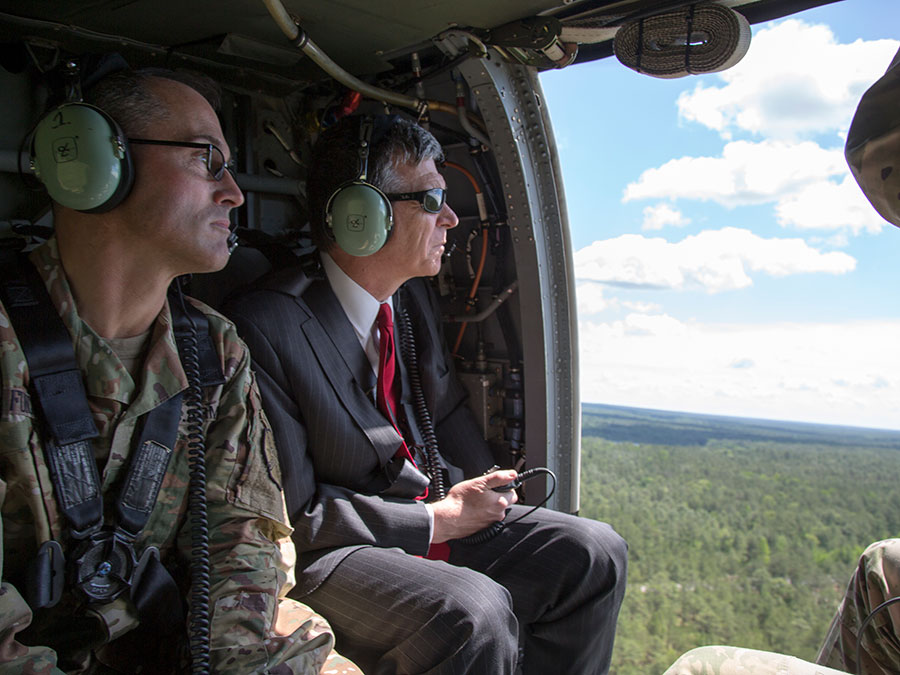
And then we have to realize that health care is a key factor, and expansion of Medicaid could be one of the most important economic boosts to rural North Carolina. It is going to create over 40,000 new health care jobs in our state. It is going to insure over 600,000 people and it is going to help with the bottom line of rural hospitals, because many of them are struggling for existence.
Finally, significant investments in education are critical. Good public schools—and particularly strong community colleges for rural areas—are the linchpin to success. I worry about the commitment to education of our last few budgets; we need to make sure that we fund these schools because they are critical in rural North Carolina.
Q: Tell us about your Hometown Strong initiative as it applies to these and other challenges you see facing rural NC.
A: Most local governments don’t have big staffs, and they spend a lot of their time just keeping the trains on the track, so their long-range planning — making sure that the county is economically successful and they have a good quality of life — they struggle with that. They also struggle with knowing what resources are available to them and how they can navigate the thicket of state and federal government.
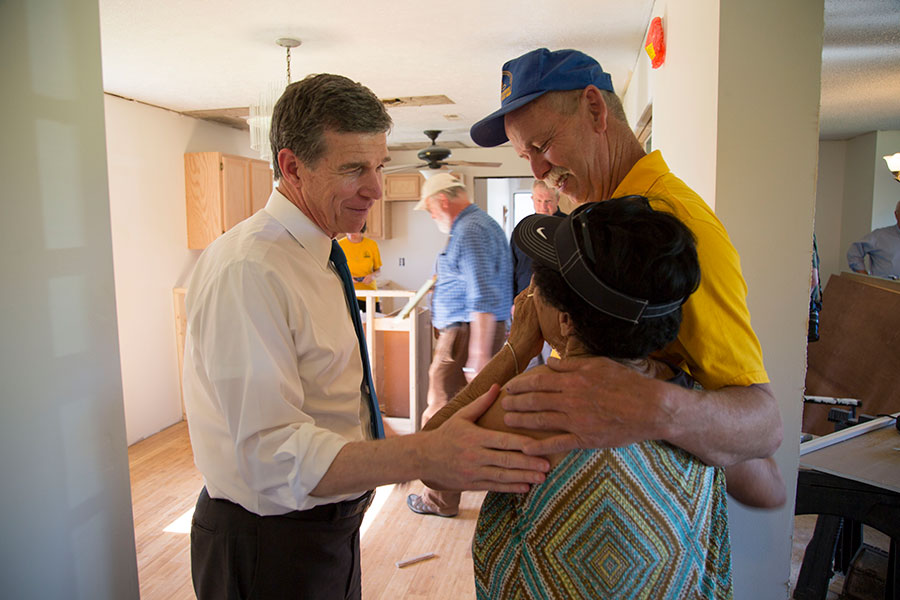
Hometown Strong was born of the idea that breaking down silos and increasing communication can help rural counties succeed. So instead of creating a new agency or a new bureaucracy, we created a small action team in the governor’s office that is charged with helping local rural counties achieve their goals. And using the convening power of the governor’s office and my charge to all of the agencies to pay attention to Hometown Strong, we have already gotten off to a great start.
The team has visited a number of rural counties, and when local leaders see the state agencies all represented in one room to help them deal with some of their most significate challenges, they have found it to be extraordinarily helpful.
We know that Hometown Strong isn’t bringing a big bag of money to the county, but what it is bringing is the ability to communicate and to solve problems and potentially find areas of funding that the county may not have known about previously.
So we are excited about this effort. The idea was generated because of where I come from and what I grew up with, and how amazing life in rural North Carolina can be, particularly when counties can meet challenges and make sure they can provide a great quality of life for the people who are there.
Q: What do you consider to be the most pressing energy issues facing North Carolina?
A: Having low-cost, reliable energy is critical to economic development. I knew that before I became governor, but in the business of recruiting companies to be here, you find what a crucial factor that is.
We are No. 2 in the country in solar energy, and a lot of that has come in the rural parts of our state. So we have to make sure that we are paying attention to renewable energy and making it a critical part of our energy future. I am excited about what we can do.
We need to work on making sure that we have reliable energy, but I do not think it should come at a cost of offshore drilling. I think that is wrong for our state. I think the risks of offshore drilling are too great to take that chance.
Q: What do you see as the biggest challenges ahead for your first term as governor?
A: I want to get our teachers’ salaries at least to the national average. I want to improve spending for our public schools. I want to make sure that North Carolina is a Top 10 educated state by 2025. I believe we are already there with our community colleges and our universities, but even with them we are going to need continued investment. We have to do more with investment at early childhood, Pre-K, K through 12. I am talking cradle-to-college investment in education.
My “CEO Mission Statement” for North Carolina is that we have a state where people are better educated, where they are healthier, where they have more money in their pockets and the opportunities to live a more abundant and purposeful life.
Our investments in education are going to be critical in making sure we achieve that mission statement.
To send an email to Gov. Cooper or follow him on social media, visit governor.nc.gov.
-
North Carolina Governors, past and present
-
Share this story:

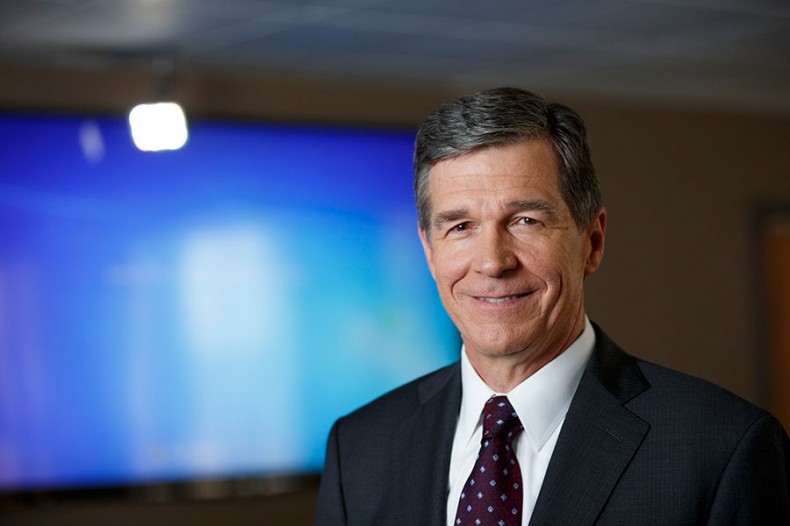


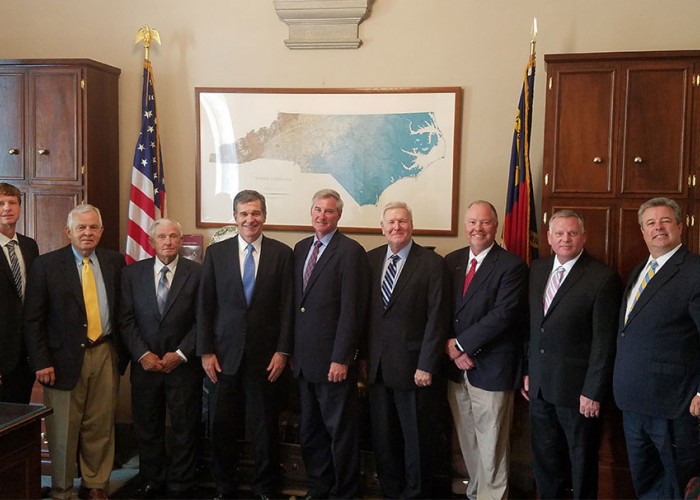
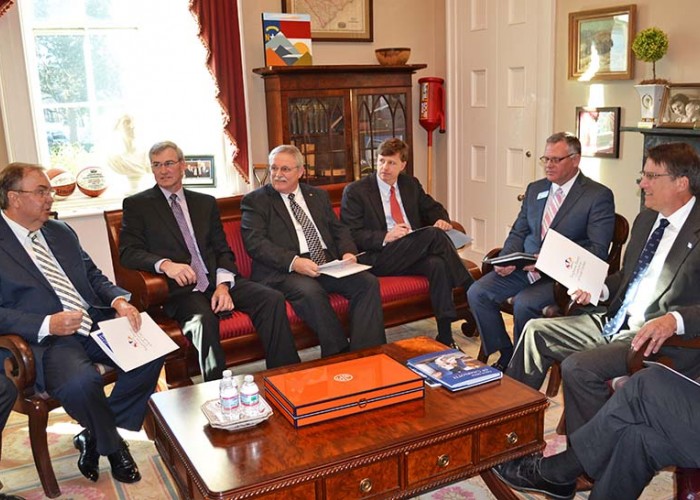



Comments (1)
Benita Wells |
August 02, 2018 |
reply